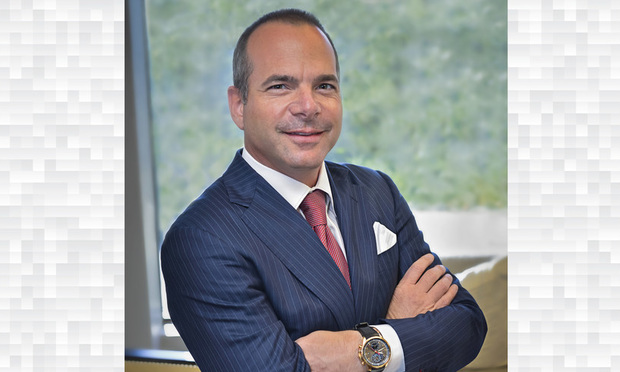Appellate Lawyer of the Week: Austin Lawyer Defends His Own $211M Damage Win Against Bank
Austin attorney Bill Reid didn't want to hand over the defense of his biggest verdict ever to just any appellate lawyer. So he argued the case himself.
February 21, 2018 at 04:33 PM
4 minute read

After taking on Credit Suisse in back-to-back trials that netted his client a $211 million damage judgment in a fraud and breach-of-contract case three years ago, Austin attorney Bill Reid didn't want to hand over the defense of his biggest verdict ever to just any appellate lawyer. So he argued the case himself.
That move paid off on Feb. 20 when Dallas' Fifth Court of Appeals affirmed his client's win against the Swiss investment bank in Credit Suisse v. Claymore Holdings.
Reid, a partner in Reid Collins & Tsai, notes that while many lawyers and clients prefer to hand their cases off to an appellate specialist after trial, that wasn't happening in this case.
“I wasn't going to let another appellate lawyer lose the most important accomplishment I've ever had in a court during my legal career,” Reid said. “I was going to win or lose this one myself.”
Reid's client, Dallas-based hedge fund Claymore Holdings, sued Credit Suisse in a state district court in 2015 alleging the bank had overinflated the value of a Nevada resort as part of a 2007 loan financing transaction causing Claymore to lose a $250 million investment.
When the borrowers defaulted on the loan, Reid argued his clients were left “holding the bag” on the resort, which was worth far less than the bank had represented months earlier.
After a three-week trial, Reid and his law partner Lisa Tsai convinced a jury that Credit Suisse defrauded their client as part of a loan refinancing transaction that resulted in a $40 million verdict.
Later in a separate trial before the court, Reid and Tsai also won a breach-of-contract claim against the bank, which resulted in a final judgment of $211 million in damages, plus prejudgment interest of $75 million.
Credit Suisse appealed the judgment to the Fifth Court. But the appellate court rejected all of the bank's appellate points on appeal, including that Claymore's fraud claim was barred due to contract disclaimers among other things.
“We conclude that the credit agreement disclaimers do not preclude Claymore's breach of contract claims,” wrote Justice Elizabeth Lang-Miers in a decision that affirmed the trial court's $211 million award, including $75 million in interest.
However, the appellate ruling wasn't a complete victory for Reid as the Fifth Court rejected two of his client's appellate issues, including a request for a $7 million unjust-enrichment award and an argument that the prejudgment award should be higher.
“Any day you win a $270 million appeal and you lose a few issues, it's a good day,'' Reid said.
Josh Rosenkranz, a New York partner in Orrick, Herrington & Sutcliffe who represents Credit Suisse and heads the firm's Supreme Court and appellate litigation practice, did not return a call for comment.
Reid got help briefing the case from Dallas appellate attorney Jeff Levinger and other members of his firm. And he prepared for arguing the case by sequestering himself inside his Austin house for nearly a month, going over his appellate points relentlessly.
“About two or three weeks before argument, I didn't go outside,” Reid said. “My family went on spring break without me.”
Reid believes a big reason he won the case is because he knew the trial record in a way that Credit Suisse's appellate lawyer couldn't.
“This case was extremely complicated,” Reid said. “And one of the advantages I had over the competition is I'd already tried this case twice—to a judge and to a jury.''
This content has been archived. It is available through our partners, LexisNexis® and Bloomberg Law.
To view this content, please continue to their sites.
Not a Lexis Subscriber?
Subscribe Now
Not a Bloomberg Law Subscriber?
Subscribe Now
NOT FOR REPRINT
© 2025 ALM Global, LLC, All Rights Reserved. Request academic re-use from www.copyright.com. All other uses, submit a request to [email protected]. For more information visit Asset & Logo Licensing.
You Might Like
View All
Trump Mulls Big Changes to Banking Regulation, Unsettling the Industry

Greenberg Traurig Initiates String of Suits Following JPMorgan Chase's 'Infinite Money Glitch'


What Does the House's Crypto Legislation Mean for Digital Asset Providers?
10 minute readTrending Stories
- 1Family Court 2024 Roundup: Part I
- 2In-House Lawyers Are Focused on Employment and Cybersecurity Disputes, But Looking Out for Conflict Over AI
- 3A Simple 'Trial Lawyer' Goes to the Supreme Court
- 4Clifford Chance Adds Skadden Rainmaker in London
- 5Latham, Kirkland and Paul Weiss Climb UK M&A Rankings
Who Got The Work
J. Brugh Lower of Gibbons has entered an appearance for industrial equipment supplier Devco Corporation in a pending trademark infringement lawsuit. The suit, accusing the defendant of selling knock-off Graco products, was filed Dec. 18 in New Jersey District Court by Rivkin Radler on behalf of Graco Inc. and Graco Minnesota. The case, assigned to U.S. District Judge Zahid N. Quraishi, is 3:24-cv-11294, Graco Inc. et al v. Devco Corporation.
Who Got The Work
Rebecca Maller-Stein and Kent A. Yalowitz of Arnold & Porter Kaye Scholer have entered their appearances for Hanaco Venture Capital and its executives, Lior Prosor and David Frankel, in a pending securities lawsuit. The action, filed on Dec. 24 in New York Southern District Court by Zell, Aron & Co. on behalf of Goldeneye Advisors, accuses the defendants of negligently and fraudulently managing the plaintiff's $1 million investment. The case, assigned to U.S. District Judge Vernon S. Broderick, is 1:24-cv-09918, Goldeneye Advisors, LLC v. Hanaco Venture Capital, Ltd. et al.
Who Got The Work
Attorneys from A&O Shearman has stepped in as defense counsel for Toronto-Dominion Bank and other defendants in a pending securities class action. The suit, filed Dec. 11 in New York Southern District Court by Bleichmar Fonti & Auld, accuses the defendants of concealing the bank's 'pervasive' deficiencies in regards to its compliance with the Bank Secrecy Act and the quality of its anti-money laundering controls. The case, assigned to U.S. District Judge Arun Subramanian, is 1:24-cv-09445, Gonzalez v. The Toronto-Dominion Bank et al.
Who Got The Work
Crown Castle International, a Pennsylvania company providing shared communications infrastructure, has turned to Luke D. Wolf of Gordon Rees Scully Mansukhani to fend off a pending breach-of-contract lawsuit. The court action, filed Nov. 25 in Michigan Eastern District Court by Hooper Hathaway PC on behalf of The Town Residences LLC, accuses Crown Castle of failing to transfer approximately $30,000 in utility payments from T-Mobile in breach of a roof-top lease and assignment agreement. The case, assigned to U.S. District Judge Susan K. Declercq, is 2:24-cv-13131, The Town Residences LLC v. T-Mobile US, Inc. et al.
Who Got The Work
Wilfred P. Coronato and Daniel M. Schwartz of McCarter & English have stepped in as defense counsel to Electrolux Home Products Inc. in a pending product liability lawsuit. The court action, filed Nov. 26 in New York Eastern District Court by Poulos Lopiccolo PC and Nagel Rice LLP on behalf of David Stern, alleges that the defendant's refrigerators’ drawers and shelving repeatedly break and fall apart within months after purchase. The case, assigned to U.S. District Judge Joan M. Azrack, is 2:24-cv-08204, Stern v. Electrolux Home Products, Inc.
Featured Firms
Law Offices of Gary Martin Hays & Associates, P.C.
(470) 294-1674
Law Offices of Mark E. Salomone
(857) 444-6468
Smith & Hassler
(713) 739-1250






